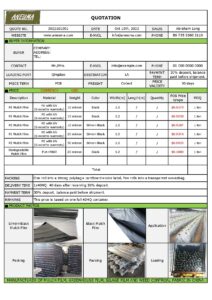Introduction
Soil erosion is a significant concern in modern agriculture, leading to reduced crop productivity, water pollution, and degradation of natural resources. As agricultural practices intensify, the risk of soil erosion escalates, necessitating the adoption of effective erosion control measures. Mulch film, a protective covering laid on the soil surface, offers a powerful solution to combat soil erosion and enhance sustainable agricultural practices. This article explores the benefits of mulch film and how it plays a pivotal role in preventing soil erosion.
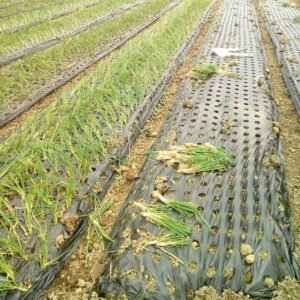
Understanding Soil Erosion and Its Impacts
Soil erosion is the natural process of soil displacement by wind, water, or other environmental factors. However, human activities, such as deforestation, improper land management, and intensive agriculture, accelerate the erosion rates beyond natural levels. The consequences of soil erosion are far-reaching and severe:
- Reduced Soil Fertility: Erosion removes the nutrient-rich topsoil, which is crucial for plant growth, leading to decreased crop yields and productivity.
- Water Quality Degradation: Eroded soil particles enter water bodies, impairing water quality by increasing sediment content and carrying pollutants, like pesticides and fertilizers.
- Loss of Arable Land: Over time, significant soil erosion can render once-fertile land unsuitable for cultivation, exacerbating food security challenges.
- Increased Flooding: Eroded soil can clog waterways and drainage systems, increasing the risk of floods during heavy rainfall events.
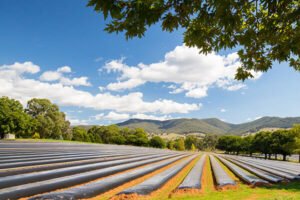
The Role of Mulch Film in Soil Erosion Prevention
Mulch film is a thin, protective material made of plastic or biodegradable materials that farmers place directly on the soil surface. Its primary purpose is to create a barrier between the soil and external elements, effectively mitigating erosion. There are two main types of mulch films used in agriculture:
- Plastic Mulch Film: This type of mulch film is made from polyethylene or other plastics. It helps conserve soil moisture, controls weed growth, and regulates soil temperature, creating an optimal environment for plant growth.
- Biodegradable Mulch Film: Composed of organic materials like cornstarch or other plant-based polymers, biodegradable mulch film provides similar benefits to plastic mulch but degrades over time, reducing the need for removal and disposal.
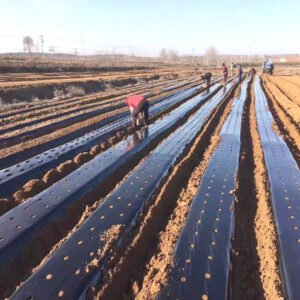
How Mulch Film Prevents Soil Erosion
- Erosion Control: Mulch film forms a physical barrier that shields the soil from the impact of raindrops and the erosive forces of wind. By reducing direct contact with these agents, the film significantly minimizes soil detachment and surface runoff.
- Water Conservation: Both plastic and biodegradable mulch films aid in water retention by reducing evaporation and limiting surface water runoff. The film’s impermeable nature prevents water from escaping the soil, directing it to the plant root zone where it is most needed.
- Soil Temperature Regulation: Mulch film can regulate soil temperatures, protecting plants from extreme heat or cold. This temperature moderation helps maintain soil structure and microbial activity, further enhancing soil health.
- Weed Suppression: Uncontrolled weed growth can exacerbate soil erosion. Mulch film acts as a weed barrier, preventing weed seeds from germinating and competing with crops for essential nutrients and water.
- Enhanced Soil Structure: Mulch film encourages the aggregation of soil particles, leading to improved soil structure. This promotes better water infiltration and reduces the risk of surface crusting, which hinders plant growth.
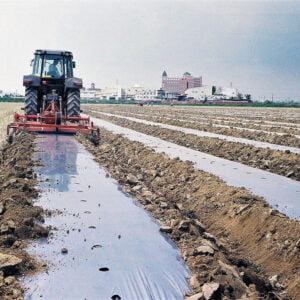
Benefits of Mulch Film in Sustainable Agriculture
- Improved Crop Yields: By conserving water, regulating soil temperature, and providing essential nutrients, mulch film fosters optimal conditions for crop growth, leading to increased yields and better-quality produce.
- Reduced Water Usage: Mulch film minimizes water loss through evaporation and runoff, making irrigation practices more efficient and sustainable.
- Weed and Pest Management: As a physical barrier, mulch film reduces the need for chemical herbicides and pesticides, promoting eco-friendly and healthier farming practices.
- Soil Health and Fertility: By protecting the topsoil and enhancing soil structure, mulch film supports a diverse and thriving soil ecosystem, contributing to long-term soil health and fertility.
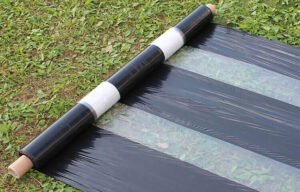
Conclusion
Soil erosion is a pressing challenge in modern agriculture, but innovative solutions like mulch film offer effective ways to combat this issue. By creating a protective shield against erosive agents, mulch film not only prevents soil loss but also improves water conservation, weed control, and overall soil health. Embracing mulch film as part of sustainable agricultural practices can lead to increased crop productivity, reduced environmental impact, and the preservation of precious arable land for future generations. As farmers and policymakers alike recognize the importance of erosion control, the widespread adoption of mulch film holds tremendous potential for the advancement of agriculture and environmental preservation.

